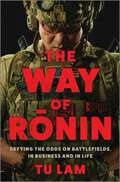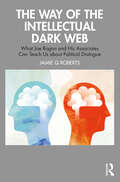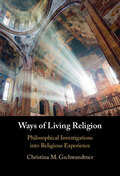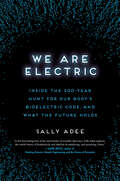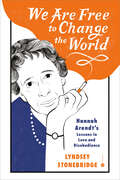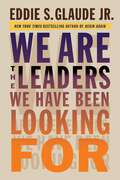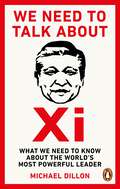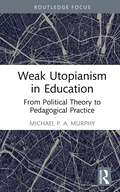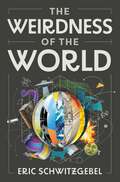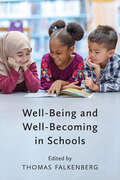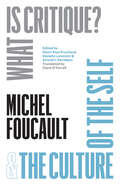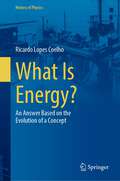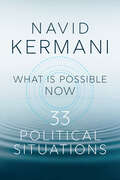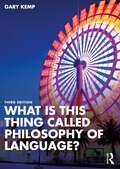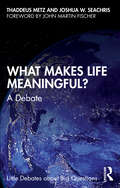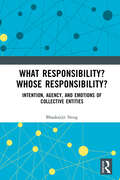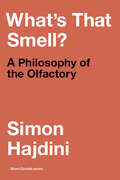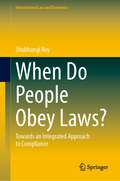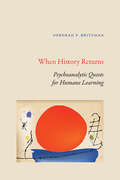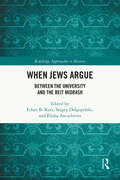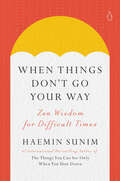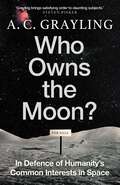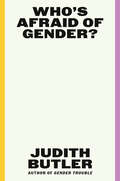- Table View
- List View
The Way of Ronin: Defying the Odds on Battlefields, in Business and in Life
by Tu LamFrom Special Forces veteran and internationally respected teacher of Ronin Tactics to streaming and videogame fan favorite, Tu Lam&’s memoir will captivate, astonish, exhilarate, and even profoundly resonate.Tu Lam has become known not just for his accomplishments as a decorated Green Beret, but also for his work outside the military, including: Training citizens and law enforcement professionals all over the country Providing aid to both active and retired soldiers with physical and mental health issues Co-hosting the History Channel&’s Forged in Fire: Knife or Death Appearing in and contributing to the world&’s bestselling video game, Call of Duty: Modern WarfareIn The Way of Ronin, he reveals his against-all-odds story. Tu Lam&’s resilience, dedication, and relentless pursuit of freedom saw him achieving Full Spectrum US Special Operations across twenty-seven countries worldwide for more than twenty years, only to pay the price of his own physical and mental trauma as well as addiction.That decision led him to more than two decades of grueling instruction in every facet of the special forces, then deployment to war and conflict zones—all while channeling his inner anger in secret underground no-holds-barred fighting matches. When he finally retired from the military after more than two decades, his demons caught up with him, leading to years of addiction. But even that didn&’t defeat him. Confronting his demons, he emerged triumphant. Now he shares the gripping details and riveting intricacies of this awe-inspiring journey.Tu Lam&’s life is, at times, all too real, and at many others times, almost unbelievable. For fans of Jocko Willink and David Goggins, The Way of Ronin is an ultimately triumphant autobiography of what one man can accomplish against seemingly insurmountable odds.
The Way of the Intellectual Dark Web: What Joe Rogan and His Associates Can Teach Us about Political Dialogue
by Jamie Q RobertsRoberts presents a rigorous and accessible assessment of the Intellectual Dark Web’s origins, shared philosophy, cultural importance, and limitations. Since the mid-2010s, the Intellectual Dark Web (IDW) has been an unprecedented cultural and intellectual phenomenon. Using primarily podcasts and YouTube videos, a new generation of public intellectuals has appeared, loosely coalesced, and gained a vast global audience. This movement has encompassed a range of individuals, notably Joe Rogan, Jordan Peterson, Eric and Bret Weinstein, Ben Shapiro, Heather Heying, and Sam Harris. Other names more broadly associated with the grouping have included Steven Pinker, Jonathan Haidt, Elon Musk, Niall Ferguson, and Stephen Fry. There is a sprawling and ever-growing list of those who have appeared on IDW podcasts and videos, started their own podcasts along similar lines, and share a general ethos. It is a dispersed movement, but a significant one, given the reach of these various online outlets is in the millions globally. Roberts draws together and synthesises the core ideas espoused by the members of this movement and critically assesses its origins, coherence, and the impact it has had on politics and public discourse. He asks – to what extent has the IDW lived up to its professed goal of moving beyond polarisation and radicalisation? An insightful read both for followers of the IDW looking for a coherent and critical overview and for students of popular culture looking to understand this massive but decentralised popular intellectual movement.
Ways of Living Religion: Philosophical Investigations into Religious Experience
by null Christina M. GschwandtnerWays of Living Religion provides a philosophical analysis of different types of religious experience - ascetic, liturgical, monastic, mystical, devotional, compassionate, fundamentalist - that focuses on the lived experience of religion rather than reducing it to mere statements of belief or doctrine. Using phenomenology, Christina M. Gschwandtner distinguishes between different kinds of religious experiences by examining their central characteristics and defining features, as well as showing their continuity with human experience more broadly. The book is the first philosophical examination of several of these types, thus breaking new ground in philosophical thinking about religion. It is neither a confessional treatment nor a reduction of the lived experience to psychological or sociological phenomena. While Gschwandtner's treatment focuses on Christian forms of expression of these different types, it opens the path to broader examinations of ways of living religion that might enable scholars to give a more nuanced account of their similarities and differences.
We Are Electric: Inside the 200-Year Hunt for Our Body's Bioelectric Code, and What the Future Holds
by Sally AdeeScience journalist Sally Adee breaks open the field of bioelectricity—the electric currents that run through our bodies and every living thing—its misunderstood history, and why new discoveries will lead to new ways around antibiotic resistance, cleared arteries, and new ways to combat cancer. You may be familiar with the idea of our body's biome: the bacterial fauna that populate our gut and can so profoundly affect our health. In We Are Electric we cross into new scientific understanding: discovering your body's electrome. Every cell in our bodies—bones, skin, nerves, muscle—has a voltage, like a tiny battery. It is the reason our brain can send signals to the rest of our body, how we develop in the womb, and why our body knows to heal itself from injury. When bioelectricity goes awry, illness, deformity, and cancer can result. But if we can control or correct this bioelectricity, the implications for our health are remarkable: an undo switch for cancer that could flip malignant cells back into healthy ones; the ability to regenerate cells, organs, even limbs; to slow aging and so much more. The next scientific frontier might be decrypting the bioelectric code, much the way we did the genetic code. Yet the field is still emerging from two centuries of skepticism and entanglement with medical quackery, all stemming from an 18th-century scientific war about the nature of electricity between Luigi Galvani (father of bioelectricity, famous for shocking frogs) and Alessandro Volta (inventor of the battery). In We Are Electric, award-winning science writer Sally Adee takes readers through the thrilling history of bioelectricity and into the future: from the Victorian medical charlatans claiming to use electricity to cure everything from paralysis to diarrhea, to the advances helped along by the giant axons of squids, and finally to the brain implants and electric drugs that await us—and the moral implications therein. The bioelectric revolution starts here.
We Are Free to Change the World: Hannah Arendt's Lessons in Love and Disobedience
by Lyndsey StonebridgeA timely guide on how to live—and think—through the challenges of our century drawn from the life and thought of political theorist Hannah Arendt, one of the twentieth century&’s foremost opponents of totalitarianism&“We are free to change the world and to start something new in it.&”—Hannah ArendtThe violent unease of today&’s world would have been familiar to Hannah Arendt. Tyranny, occupation, disenchantment, post-truth politics, conspiracy theories, racism, mass migration: She lived through them all.Born in the first decade of the last century, she escaped fascist Europe to make a new life for herself in America, where she became one of its most influential—and controversial—public intellectuals. She wrote about power and terror, exile and love, and above all, about freedom. Questioning—thinking—was her first defense against tyranny. She advocated a politics of action and plurality, courage and, when necessary, disobedience.We Are Free to Change the World is a book about the Arendt we need for the twenty-first century. It tells us how and why Arendt came to think the way she did, and how to think when our own politics goes off the rails. Both a guide to Arendt&’s life and work, and its dialogue with our troubled present, We Are Free to Change the World is an urgent call for us to think, as Hannah Arendt did—unflinchingly, lovingly, and defiantly—through our own unpredictable times.
We Are the Leaders We Have Been Looking For (The W. E. B. Du Bois Lectures)
by Eddie Glaude Jr.From the author of the New York Times bestseller Begin Again, a politically astute, lyrical meditation on how ordinary people can shake off their reliance on a small group of professional politicians and assume responsibility for what it takes to achieve a more just and perfect democracy.“Like attending a jazz concert with all of one’s favorite musicians…James Baldwin, Martin Luther King, Jr., Malcolm X, Ella Baker, Toni Morrison, and more…Glaude brilliantly takes us on an epic tour through their lives and work.”―Henry Louis Gates, Jr., author of The Black Box: Writing the RaceWe are more than the circumstances of our lives, and what we do matters. In We Are the Leaders We Have Been Looking For, one of the nation’s preeminent scholars and a New York Times bestselling author, Eddie S. Glaude Jr., makes the case that the hard work of becoming a better person should be a critical feature of Black politics. Through virtuoso interpretations of Martin Luther King, Jr., Malcolm X, and Ella Baker, Glaude shows how we have the power to be the heroes that our democracy so desperately requires.Based on the Du Bois Lectures delivered at Harvard University, the book begins with Glaude’s unease with the Obama years. He felt then, and does even more urgently now, that the excitement around the Obama presidency constrained our politics as we turned to yet another prophet-like figure. He examines his personal history and the traditions that both shape and overwhelm his own voice.Glaude weaves anecdotes about his evolving views on Black politics together with the writings of Ralph Waldo Emerson, John Dewey, Toni Morrison, James Baldwin, and Ralph Ellison, encouraging us to reflect on the lessons of these great thinkers and address imaginatively the challenges of our day in voices uniquely our own.Narrated with passion and philosophical intensity, this book is a powerful reminder that if American democracy is to survive, we must step out from under the shadows of past giants to build a better society—one that derives its strength from the pew, not the pulpit.
We Need To Talk About Xi: What we need to know about the world’s most powerful leader
by Michael DillonMeet the most powerful leader in the world. Chinese premier Xi Jinping graces our television screens and news headlines on a regular basis. But even after a decade in power, he remains shrouded in mystery.From growing up with a father purged in Mao's Cultural Revolution and his mission to eradicate poverty, to his persecution of Uyghur Muslims and paranoia about being likened to Winnie-the-Pooh, Xi Jinping is a man obscured by caricatures. In this short, essential primer, historian and writer Michael Dillon unveils the character of Xi Jinping - arguably the world's most powerful man - to truly understand his grip on China, what he wants and how the West gets him wrong.But this is not just the story of Xi; this is the story of today's largest economic powerhouse, which dives into the crux of the issue - what does Xi's leadership of China mean for the rest of the world, and what will he do next?
Weak Utopianism in Education: From Political Theory to Pedagogical Practice (Rethinking Education)
by Michael P. MurphyIn the light of the structural dangers of revolutionary change highlighted in the political theory of Giorgio Agamben, this book joins a lively debate in philosophy of education on weak utopianism as an approach that foregrounds and respects the educational potentiality of teachers and students. Utopian moves in education call for revolutionary changes in pedagogical practice in pursuit of a particular vision of the good. Whether grounded in emancipatory politics, technological enthusiasm, or another social movement, utopian moves are seductive in their promise of a better alternative. Weak Utopianism in Education draws together philosophy of education, political theory, scholarship of teaching and learning research, and utopian thought to advocate for a modest and humble approach to change. The theoretical foundation of weak utopianism opens space for educator’s personal convictions and teaching philosophies to tinker with their own pedagogical practices. The book creates a common conceptual meeting ground for philosophers and practitioners in education.
The Weirdness of the World
by Eric SchwitzgebelHow all philosophical explanations of human consciousness and the fundamental structure of the cosmos are bizarre—and why that&’s a good thingDo we live inside a simulated reality or a pocket universe embedded in a larger structure about which we know virtually nothing? Is consciousness a purely physical matter, or might it require something extra, something nonphysical? According to the philosopher Eric Schwitzgebel, it&’s hard to say. In The Weirdness of the World, Schwitzgebel argues that the answers to these fundamental questions lie beyond our powers of comprehension. We can be certain only that the truth—whatever it is—is weird. Philosophy, he proposes, can aim to open—to reveal possibilities we had not previously appreciated—or to close, to narrow down to the one correct theory of the phenomenon in question. Schwitzgebel argues for a philosophy that opens.According to Schwitzgebel&’s &“Universal Bizarreness&” thesis, every possible theory of the relation of mind and cosmos defies common sense. According to his complementary &“Universal Dubiety&” thesis, no general theory of the relationship between mind and cosmos compels rational belief. Might the United States be a conscious organism—a conscious group mind with approximately the intelligence of a rabbit? Might virtually every action we perform cause virtually every possible type of future event, echoing down through the infinite future of an infinite universe? What, if anything, is it like to be a garden snail? Schwitzgebel makes a persuasive case for the thrill of considering the most bizarre philosophical possibilities.
Well-Being and Well-Becoming in Schools
by Thomas FalkenbergBy its very nature, school education is concerned with student well-being. Written by Canadian education scholars from a Manitoba-based research group, Well-Being and Well-Becoming in Schools aims to develop the notion that what we wish for our children is their well-being and well-becoming as they live their lives. This collection brings education scholars together to focus on a timely topic that has been of rapidly increasing interest to the research and education communities: student well-being and flourishing schools. Contributors address a broad range of issues that arise from this position to create a rich and integrated understanding of the topic. Chapters focus on foundational issues, conceptual issues, socio-cultural and organizational issues, and pedagogical and curricular issues. Ultimately, Well-Being and Well-Becoming in Schools weaves together substantial ideas to create an integrative framework that will not only serve as a guide for further research, but also for school educational leaders and educators to implement the idea of making school education primarily about student well-being.
What Do We Owe Other Animals?: A Debate (Little Debates about Big Questions)
by Bob Fischer Anja JauernigPhilosophers Bob Fischer and Anja Jauernig agree that human society often treats animals in indefensible ways and that all animals morally matter; they disagree on whether humans and animals morally matter equally. In What Do We Owe Other Animals?: A Debate, Fischer and Jauernig square off over this central question in animal ethics. Jauernig defends the view that all living beings morally matter equally and are owed compassion, on account of which we are also obligated to adopt a vegan diet. Fischer denies that we have an obligation to become vegans, and argues for the position that humans morally matter more than all other living creatures. The two authors each offer a clear, well-developed opening statement, a direct response to the other’s statement, and then a response to the other’s response. Along the way, they explore central questions, like: What kind of beings matter morally? What kind of obligations do we have towards other animals? How demanding can we reasonably expect these obligations to be? Do our individual consumer choices, such as the choice to purchase factory-farmed animal products, make a difference to the wellbeing of animals? The debate is helpfully framed by introductions and conclusions to each of the major parts and by smaller introductions to each of the sub-sections. A Foreword by Dustin Crummett sets the context for the debate within a larger discussion of sentience, moral standing, reason-guided compassion, and the larger field of animal ethics. Key Features • Showcases the presentation and defense of two points of view on the moral worth of non-human animals• Provides frequent summaries of previously covered material• Includes a topically-organized list of Further Readings and a Glossary of all specialized vocabulary
What Is Critique?: & The Culture of the Self
by Michel FoucaultNewly published lectures by Foucault on critique, Enlightenment, and the care of the self. On May 27, 1978, Michel Foucault gave a lecture to the French Society of Philosophy where he redefined his entire philosophical project in light of Immanuel Kant’s 1784 text “What Is Enlightenment?” Foucault strikingly characterizes critique as the political and moral attitude consisting in the “art of not being governed like this,” one that performs the function of destabilizing power relations and creating the space for a new formation of the self within the “politics of truth.” This volume presents the first critical edition of this crucial lecture alongside a previously unpublished lecture about the culture of the self and three public debates with Foucault at the University of California, Berkeley, in April 1983. There, for the first time, Foucault establishes a direct connection between his reflections on the Enlightenment and his analyses of Greco-Roman antiquity. However, far from suggesting a return to the ancient culture of the self, Foucault invites his audience to build a “new ethics” that bypasses the traditional references to religion, law, and science.
"What Is Critique?" and "The Culture of the Self" (The Chicago Foucault Project)
by Michel FoucaultNewly published lectures by Foucault on critique, Enlightenment, and the care of the self. On May 27, 1978, Michel Foucault gave a lecture to the French Society of Philosophy where he redefined his entire philosophical project in light of Immanuel Kant’s 1784 text “What Is Enlightenment?” Foucault strikingly characterizes critique as the political and moral attitude consisting in the “art of not being governed like this,” one that performs the function of destabilizing power relations and creating the space for a new formation of the self within the “politics of truth.” This volume presents the first critical edition of this crucial lecture alongside a previously unpublished lecture about the culture of the self and three public debates with Foucault at the University of California, Berkeley, in April 1983. There, for the first time, Foucault establishes a direct connection between his reflections on the Enlightenment and his analyses of Greco-Roman antiquity. However, far from suggesting a return to the ancient culture of the self, Foucault invites his audience to build a “new ethics” that bypasses the traditional references to religion, law, and science.
What Is Energy?: An Answer Based on the Evolution of a Concept (History of Physics)
by Ricardo Lopes CoelhoThis book provides a solution to the problem with the energy concept. This problem manifests itself in the fact that physicists clearly diverge regarding the question of what energy is. Some define it but others state that we do not know what it is. Although this is a problem for physicists who need to explain the concept, it is not a problem for physics that can be solved by laboratory means. Penetrating into the origin of the notion of energy, this book offers a clear idea of what was discovered and what was invented to interpret the findings.Following the development of the concept, it provides an explanation of the trends in contemporary textbooks. The author's repetition, in his "History and Philosophy of Physics Laboratory", of Joule’s famous experiment – the paddle wheel experiment – with a calorimeter as originally used by Joule and with a calorimeter as proposed in textbooks, is presented, yielding new insight into the phenomenon. Thus, science teachers and students will benefit from reading the book as well as historians, philosophers, students of the history and philosophy of science, and all who are interested in knowing about what it is that we call energy.
What is Possible Now: 33 Political Situations
by Navid KermaniNavid Kermani is one of the outstanding public intellectuals of his generation. Not one for drawing hard and fast conclusions, his style of thought is probing, observant, often straying from well-trodden paths and always peering beyond the present moment to trace connections and grasp the bigger picture. Well known for his prize-winning novels and major works of non-fiction, Kermani has also gained widespread acclaim as a journalist, displaying a rare political sensitivity which manages to illuminate what politicians fail to see and to seek out solutions where all appears hopeless. This volume brings together his brilliantly perceptive writing from the last thirty years, on topics ranging from terror in the Middle East to Russia’s invasion of Ukraine. As a record of Kermani’s uniquely compassionate curiosity, this absorbing book is a welcome antidote to the confusion and despair that stalks global politics today.
What is this thing called Philosophy of Language? (What is this thing called?)
by Gary KempPhilosophy of language explores some of the most abstract yet most fundamental questions in philosophy. The ideas of some of the subject's great founding figures, such as Gottlob Frege, Ludwig Wittgenstein and Bertrand Russell, as well as of more recent figures such as Saul Kripke and Hilary Putnam, are central to a great many philosophical debates to this day and are widely studied. In this clear and carefully structured introduction to the subject Gary Kemp explains the following key topics: the basic nature of philosophy of language, its concepts and its historical development Frege’s theory of sense and reference; Russell's theory of definite descriptions Wittgenstein's Tractatus, Ayer, and the Logical Positivists recent perspectives including Kripke, Kaplan, Putnam, Chomsky, Quine and Davidson; arguments concerning translation, necessity, indexicals, rigid designation and natural kinds the pragmatics of language, including speech-acts, presupposition and conversational implicature puzzles surrounding the propositional attitudes (sentences which ascribe beliefs to people) the challenges presented by the later Wittgenstein contemporary directions, including contextualism, fictional objects and the phenomenon of slurs The third edition has been thoroughly revised throughout and includes a new chapter on Noam Chomsky's theory of Universal Grammar. In addition, the concluding chapter on modern directions in philosophy of language has been expanded to two chapters, and which now cover crucial emergent areas of study such as slurs, conceptual engineering and experimental philosophy.Chapter summaries, annotated further reading and a glossary make What is this thing called Philosophy of Language? an indispensable introduction to those teaching philosophy of language and will be particularly useful for students coming to the subject for the first time.
What Makes Life Meaningful?: A Debate (Little Debates about Big Questions)
by Thaddeus Metz Joshua W. SeachrisCan human life be meaningful? What does talk about life’s meaning even mean? What is God’s role, if any, in a meaningful life? These three questions frame this one-of-a-kind debate between two philosophers who have spent most of their professional lives thinking and writing about the topic of life’s meaning. In this wide-ranging scholarly conversation, Professors Thaddeus Metz and Joshua W. Seachris develop and defend their own unique answers to these questions, while responding to each other’s objections in a lively dialog format. Seachris argues that the concept of life’s meaning largely revolves around three interconnected ideas—mattering, purpose, and sense-making; that a meaningful human life involves sufficiently manifesting all three; and that God would importantly enhance the meaningfulness of life on each of these three fronts. Metz instead holds that talk of life’s meaning is about a variety of properties such as meriting pride, transcending one’s animal self, making a contribution, and authoring a life-story. For him, many lives are meaningful insofar as they exercise intelligence in positive, robust, and developmental ways. Finally, Metz argues that God is unnecessary for an objective meaning that suits human nature. Metz and Seachris develop and defend their own unique answers to these three questions, while responding to each other’s objections in a dialog format that is accessible to students though—given their new contributions—will be of great interest to scholars as well. Key Features Offers an up-to-date scholarly conversation on life’s meaning by two researchers at the forefront of research on the topic. Provides a wide-ranging, yet orderly discussion of the most important issues. Accessible for the student investigating the topic for the first time yet also valuable to the scholar working on life’s meaning. Includes helpful pedagogical features, like:- Chapter outlines and introductions;- Annotated reading lists for both students and research-level readers;- A glossary; and- Clear examples, thought experiments, narratives, and cultural references, which enhance the book’s role in thinking about life’s meaning and related topics.
What Responsibility? Whose Responsibility?: Intention, Agency, and Emotions of Collective Entities
by Bhaskarjit NeogThis book is an enquiry into the meaning and nature of collective responsibility. It analyses the moral culpability of collective entities implicated in some of the most pressing contemporary ethical issues, including institutional injustice, corporate scams, organized crimes, gang wars, genocide, xenophobia, and other group-based violence. It asks: Who is responsible when a collective is (held) responsible? Is collective responsibility merely a façon de parler, a rhetorical way of talking about individual moral responsibility, or is it more than that? Using some of the latest resources from the philosophy of action, philosophy of mind, and social ontology, the author develops a nuanced non-individualist position with the help of a concept of collective agency. He interprets collective responsibility as the responsibility of a collective without either reducing it to the responsibility of the individual members or making it a case where their moral positions become blurred. An important intervention in moral philosophy, this book will be useful for scholars and researchers of moral philosophy, philosophy of action and mind, philosophy of social sciences, and political philosophy. It will also be a theoretical resource for legal theorists, just war theorists, game theorists, business ethicists, and policy makers.
What's That Smell?: A Philosophy of the Olfactory (Short Circuits)
by Simon HajdiniHow our sense of smell engages with philosophy, psychoanalysis, and political economy—and how it can help enrich our understanding of the nature of truth, language, economy, and sexuality.Why is it that, in Indo-European languages at least, we have no language to describe smells, leaving us (and famously Juliet) no choice but to call the scent of a rose simply &“sweet&”? In What's That Smell?, a groundbreaking exploration of the intersection between philosophy, psychoanalysis, and the oft-neglected sense of smell, Simon Hajdini sets out to answer this complex question. Through new readings of traditional and modern philosophical texts, Hajdini places smell at the very center of a philosophical critique of the traditional notion of truth, challenging the idea that smell is the antiphilosophical sense par excellence.Through fresh engagements with fundamental philosophical issues, original analyses of modern literature and film, and the novel use of scientific research into smell within a humanities context, Hajdini situates problems of olfaction at the very point of inception of cultural life. He proposes that ontology, civilization, and capitalist economy alike can be said to amount to "shit management." And only by following the philosophically most deplorable of the senses, the book argues, can we better understand the central philosophical, psychoanalytical, and political issues of truth, sex, and exploitation.
When Do People Obey Laws?: Towards an Integrated Approach to Compliance (International Law and Economics)
by Shubhangi RoyThis book examines the intricate dynamics of when individuals adhere to laws, taking into account the context in which laws attempt to shape human behavior. While existing literature touches upon various reasons why people comply with laws, the book focuses on a critical question which has been missing from the discussion: when do people obey laws? By treating law as a form of social communication, it develops an integrated framework to answer this question. It explores how social, psychological, and institutional conditions shape compliance decisions of individuals. What does a law signify? When does the compulsion to obey arise? When do individuals comply out of a fear for legal sanctions or social repercussions? Why do some laws have high symbolic values and others fail despite harsh punishments? The book unveils the contextual intricacies that underlie obedience to law. It challenges conventional wisdom and offers a fresh perspective on the power and limitationsof law in shaping human behavior. For scholars and academics seeking a deeper understanding of legal compliance and role of law in shaping behaviors, this book will be an indispensable resource.
When History Returns: Psychoanalytic Quests for Humane Learning (SUNY series, Transforming Subjects: Psychoanalysis, Culture, and Studies in Education)
by Deborah P. BritzmanWhen History Returns brings together psychoanalytic theories of learning with the antinomies of social strife. From a psychoanalytic perspective, history returns through transitional scenes of inheriting a past one could not make, experiencing a present affected by what came before, and facing a future one can neither know nor predict. Taking such scenes as the subject of education, Deborah P. Britzman provides new approaches and vocabulary for conceptualizing experience and understanding, as expressed in psychoanalysis, literature, film, clinical case studies, and warm pedagogy. Britzman argues that novel quests for humane responsibility take hold in the fallout of understanding, in the feel of history, in imaginative dialogues and missed encounters, and in searches for friendship, belonging, and affiliation. Each chapter charts these quests in contemporary education, carrying readers into the heart of learning and the emotional situations that urge the transitions of difficult knowledge into care for thinking and the questions that follow.
When Jews Argue: Between the University and the Beit Midrash (Routledge Approaches to History)
by Ethan B. Katz Sergey Dolgopolski Elisha AncselovitsThis book re-thinks the relationship between the world of the traditional Jewish study hall (the Beit Midrash) and the academy: Can these two institutions overcome their vast differences? Should they attempt to do so? If not, what could two methods of study seen as diametrically opposed possibly learn from one another? How might they help each other reconceive their interrelationship, themselves, and the broader study of Jews and Judaism? This book begins with three distinct approaches to these challenges. The chapters then follow the approaches through an interdisciplinary series of pioneering case studies that reassess a range of topics including religion and pluralism in Jewish education; pain, sexual consent, and ethics in the Talmud; the place of reason and devotion among Jewish thinkers as diverse as Moses Mendelssohn, Jacob Taubes, Sarah Schenirer, Ibn Chiquitilla, Yair Ḥayim Bacharach, and the Rav Shagar; and Jewish law as a response to the post-Holocaust landscape. The authors are scholars of rabbinics, history, linguistics, philosophy, law, and education, many of whom also have traditional religious training or ordination. The result is a book designed for learned scholars, non-specialists, and students of varying backgrounds, and one that is sure to spark debate in the university, the Beit Midrash, and far beyond.
When Things Don't Go Your Way: Zen Wisdom for Difficult Times
by Haemin SunimFrom renowned Zen Buddhist teacher Haemin Sunim, a guide to turning life's challenges into opportunities for self-discoveryHave you ever felt like life has thrown you a curveball? Are you struggling to overcome unexpected challenges and setbacks?While loss, heartbreak, and loneliness are all part of the human experience, in this warm guide, internationally bestselling author Haemin Sunim shows us that these moments can actually be rare opportunities for self-discovery, serving as stepping stones to greater things in life.Drawing on Zen Buddhist philosophy and Sunim&’s own experiences, When Things Don't Go Your Way helps you navigate life's challenges with resilience and grace. Whether you're dealing with rejection, uncertainty, loneliness, conflicts in relationships, or burnout--or simply seeking to improve your mental and emotional well-being--Sunim offers a new spiritual perspective, one that helps us face life's challenges with greater ease and understanding, and offers solace and courage when we need it the most.
Who Owns the Moon?: In Defence of Humanity's Common Interests in Space
by A. C. GraylingSilicon for microchips; manganese for batteries; titanium for missiles. The moon contains a wealth of natural resources. So, as the Earth&’s supplies have begun to dwindle, it is no surprise that the world&’s superpowers and wealthiest corporations have turned their eyes to the stars. As this new Space Race begins, A.C. Grayling asks: who, if anyone, owns the moon? Or Mars? Or other bodies in near space? And what do those superpowers and corporations owe to Planet Earth and its inhabitants as a whole? From feudal common land, through the rules of the sea, to the vast, nationless expanse of Antarctica, Grayling explores the history of the places which no one, and therefore everyone, owns. Examining the many ways this so-called terra nullius has fallen victim to &‘the tragedy of the commons&’ – the tendency for communal resources to be exploited by a few individuals for personal gain at the expense of everyone else – Who Owns the Moon? puts forward a compelling argument for a bold new global consensus, one which recognises and defends the rights of everyone who lives on this planet.
Who's Afraid of Gender?
by Judith ButlerInflamed by the rhetoric of public figures, the "anti-gender ideology movement" has sought to nullify reproductive justice, undermine protections against sexual and gender violence, and strip trans and queer people of their right to pursue a life without fear of violence. Here, Judith Butler, the groundbreaking thinker whose iconic Gender Trouble redefined how we understand gender and sexuality, confronts the attacks on "gender" that have become central to right-wing movements today. Who's Afraid of Gender? examines how "gender" has become a phantasm for emerging authoritarian regimes, fascist formations, and trans-exclusionary feminists. In this vital, courageous book, Butler illuminates the concrete ways in which this phantasm of gender collects and displaces anxieties and fears of destruction, resulting in a movement that demonizes struggles for equality, fuels aggressive nationalism, and leaves millions of people vulnerable to subjugation. An essential intervention into one of the most fraught issues of our moment, Who's Afraid of Gender? is a bold call to refuse the alliance with authoritarian movements and to make a broad coalition with all those who fight against injustice. Imagining new possibilities for freedom and solidarity, Butler offers us a hopeful work of social and political analysis that is both timely and timeless—a book whose verve and rigor only they could deliver.
